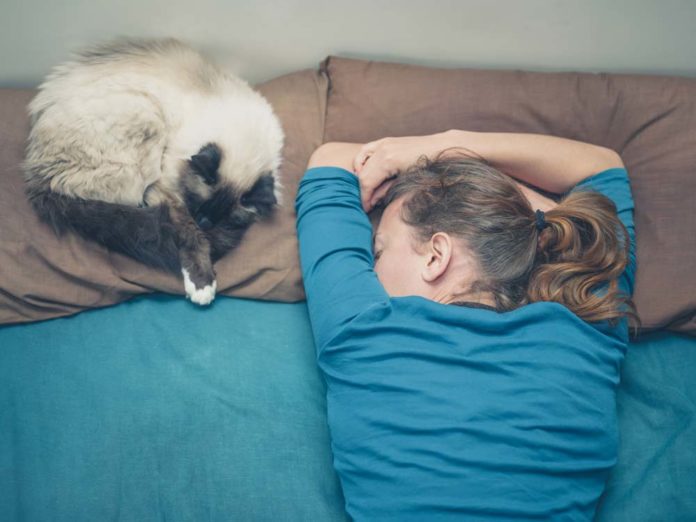Immunocompromised and living with your cat

If you are immunocompromised, you have a higher chance of contracting infections from your cat, but that doesn’t mean you have to get rid of him! Here are 5 easy ways to minimize your risk.
Millions of Americans have conditions that compromise their immune systems. They include diabetes, kidney failure, HIV, autoimmune disease, organ transplants and cancer. An immunocompromised person’s immune system is weakened either by the disease, or by the drugs used to treat it. As a result, they have less ability to fight off opportunistic infections that would normally not affect healthy people. Some of these infections can be transmitted from cats to humans, and are called zoonoses. The most common are intestinal infections caused by salmonella and Campylobacter or Cryptospiridium bacteria; cat scratch disease, from the Bartonella bacteria; and toxoplasmosis, caused by the Toxoplasma gondii parasite. Two fungal diseases, dermatomycosis (also called ringworm) and sporotrichosis, are also zoonotic and may cause skin infections in humans. Cat bites and scratches also pose a risk of infection.
Does this mean you can’t have a cat if you’re immunocompromised? Not at all! By following these simple, common sense guidelines, you can minimize your risk of contracting infection without having to give up your feline family members.
Simple precautions
1. Keep your cat indoors.
This minimizes his risk of catching diseases from birds, mice or other animals.
2. Practice safe food handling when feeding your cat.
Whether your feed your cat a raw or packaged diet, wash off all surfaces and utensils that touch the food. Don’t prepare any other food on the same surface until it has been thoroughly cleaned. Wash your hands with soap and warm water after handling any cat food.
3. Clean the litter box with care.
Your cat’s litter box should be scooped daily. If at all possible, have someone else perform this task. If that’s not an option, wear disposable gloves and wash your hands with soap and warm water afterwards. Bernadette DeLamar, a cancer survivor, shares her home with two cats. “I live alone, so I had to develop strategies to deal with the daily necessities of cat care while I was going through chemotherapy,” she says. Bernadette had a good friend stop by to once a week to clean out the litter boxes. “In between her visits, I donned a mask and rubber gloves and scooped the boxes myself.”
When cleaning out the litter box, wear disposable gloves and wash your hands with soap and warm water afterwards.

4. Avoid bites and scratches.
Cat bites present a high risk for infection, even in healthy individuals. Luckily, most cats will only bite under extreme circumstances. Immunocompromised people should never try to break up a cat fight, or handle an injured or frightened cat. Your cat’s claws should be kept trimmed to avoid getting scratched. Do not declaw him! Not only is it inhumane, but cats who no longer have their claws will turn to biting instead if they feel a need to defend themselves. “Human health authorities like the CDC and US Public Health Services don’t even mention declawing in their comprehensive document of living with companion animals after having an organ transplant,” says Jennifer Conrad, a California veterinarian and founder of The Paw Project, which aims to abolish the practice of declaw surgery. Kate Benjamin, a breast cancer survivor, has 11 cats. “As a breast cancer survivor now suffering from lymphedema in my right arm and hand, I find myself being hyper-vigilant about any cat scratches in the affected area,” she says. Because Kate’s immune system is compromised as a result of the lymphedema, any puncture wounds pose a serious threat of infection. “I’m careful to keep the cats’ nails trimmed, and if I do get scratched, I make sure to thoroughly clean the wound and seek medical care if there is any sign of infection.”
5. Work in partnership with your veterinarian.
Regular veterinary exams will ensure your cat stays in good health. Veterinarian Dr. Elizabeth Colleran especially recommends that immunocompromised clients have their cats checked regularly for parasites.
Dr. Colleran adds that the most important message for immunocompromised people is to not give up their kitties. As a cancer survivor herself, she should know. “I didn’t get rid of mine, and my oncologist didn’t advise it either. He and I both knew that having something to bring joy to your life, give you purpose and meaning, and that needs to be nurtured, helps you tolerate awful symptoms, and aids with the recovery process.”
Bernadette agrees, saying that her own two cats were her greatest solace during cancer treatment. She can’t imagine what it would have been like going through the experience without them. “They became little nursing assistants during the long months my immune system was compromised,” she says. “When I was feeling poorly and restless in bed at night, the older cat would climb up and rest his paws on my shoulder, tuck his nose under my chin, and purr until I calmed down. The younger one would come up and lean on my pillow. They had never done these things before!”
Hopefully, you won’t ever be diagnosed with a condition that compromises your immune system. But if you do, know that by taking a few precautions against zoonoses, you can keep your feline friend by your side!




